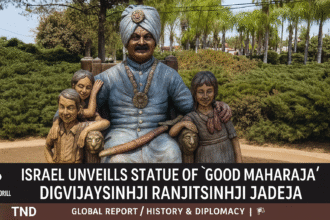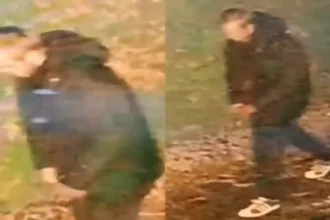
In a major breakthrough, the Anti Rowdy Squad (ARS) of Kolkata Police has arrested Bangladeshi model Shanta Pal for possessing a slew of fake and forged identity documents, raising concerns over a possible transnational identity fraud racket. The model, known in Dhaka’s fashion circuit, was taken into custody from a residential locality in Kolkata following a tip off.
During a meticulous search of her belongings, the police made a startling discovery: multiple Bangladeshi passports issued in her name, an employee ID card from Regent Airways (Bangladesh), an admit card for secondary education from Dhaka, two Aadhaar cards with different residential addresses, an Indian Voter ID (EPIC) card, and a ration card with yet another address all suggesting a systematic case of identity manipulation and infiltration.
Who Is Shanta Pal?
Shanta Pal is a well known face in certain modeling circuits of Bangladesh, especially noted for her appearance in local advertisements and ramp shows. However, what initially appeared to be a case of a foreign model trying her luck in Indian fashion turned murky when documents in her possession didn’t add up. Authorities now suspect her entry into India might have been illegal, with intent to obtain Indian documents to establish a new identity.
What the Police Found
Anti Rowdy Squad told that a team of officers raided a rented flat in South Kolkata based on intelligence inputs. What they uncovered was shocking:
Multiple Bangladeshi passports with varying issuance dates but all in her name.
An official employee ID of Regent Airways, one of Bangladesh’s commercial airlines, indicating possible links with personnel in the aviation sector.
An academic admit card from a Dhaka based school, indicating her roots in Bangladesh.
Two separate Aadhaar cards with different addresses a serious red flag under Indian law.
An Indian Voter ID (EPIC) card, typically issued only to Indian citizens.
A ration card carrying a different address altogether, again suggesting use of forged documents for access to public distribution systems.
How Did She Enter India?
Kolkata Police are now investigating how Shanta Pal managed to cross the India Bangladesh border and, more crucially, how she acquired Indian identification documents without detection. A senior officer from the ARS stated, “We’re probing potential involvement of a larger racket that might be helping foreign nationals get Indian IDs using forged documents. This could have serious national security implications.”
It is still unclear whether she used land routes via Petrapole or other entry points to cross into India or whether the documents were forged entirely without crossing borders. Either scenario indicates significant loopholes in identity verification systems.
Identity Fraud and National Security
The case of Shanta Pal’s arrest highlights a growing concern around identity fraud and illegal migration in Eastern India, especially in states bordering Bangladesh such as West Bengal and Assam. Over the years, several cases have emerged of Bangladeshi nationals living in India using forged documents, often acquiring voter IDs, Aadhaar cards, and even government jobs.
This raises multiple security and policy questions:
- How are multiple fake IDs being issued without centralized verification?
- What loopholes exist in border management and state verification processes?
- Are insiders involved in document fabrication?
Police believe Shanta Pal might not be the only one. “If someone can hold both Indian and Bangladeshi IDs and live comfortably in a metro city like Kolkata, we have to question the efficiency of our documentation and verification systems,” said one officer involved in the investigation.
Ongoing Investigation
The Kolkata Police’s Anti Rowdy Squad has now involved the Special Task Force (STF) and immigration authorities to probe the broader network that might have helped Shanta. She has been booked under multiple sections of the Indian Penal Code (IPC) for forgery, cheating, and impersonation, along with provisions of the Foreigners Act and the Passport Act.
Investigators are also examining whether any real estate brokers, document agents, or local officials were involved in facilitating her fake documentation.
The arrest comes just weeks after security agencies issued alerts about possible cross border infiltration in Eastern India, especially with increasing tensions in border districts. The timing of the arrest strengthens the suspicion that such infiltrations may not just be isolated cases but part of a larger network of illegal migration, identity theft, and potential espionage.
Political Reactions and Public Response
Political parties have already started responding to the arrest. A BJP spokesperson in West Bengal demanded a central level probe into the matter, stating that the TMC government has been “soft on border infiltration and illegal migration.”
TMC officials, on the other hand, maintained that the police have acted swiftly and there is no need for politicizing a law enforcement success.
Meanwhile, the public reaction has been mixed some shocked that such identity manipulation can go unnoticed for so long in urban areas, while others suspect this is only the tip of the iceberg.
Implications for India-Bangladesh Relations
While India and Bangladesh have a generally cordial relationship, illegal migration has remained a thorny issue. Shanta Pal’s arrest may trigger fresh diplomatic discussions, especially if it is found that she had official documents issued by both nations.
Kolkata Police have also informed the Bangladesh High Commission, and communication between law enforcement agencies across the border is expected in the coming days.
The arrest of Bangladeshi model Shanta Pal in Kolkata is not just a case of forged documents it is an alarming window into how fraudulent identities can be used to exploit loopholes in national security systems. With documents ranging from passports to ration cards under her name, Shanta Pal could be the face of a wider identity fraud network that spans borders.
As India strengthens its digital identity infrastructure, cases like these should serve as a wake up call for both state and central agencies to tighten cross border verification, digitization of records, and crack down on agents who manipulate the system for profit.
Stay Connected with The News Drill for more updates.
Contact us: contact@thenewsdrill.com
Submit a tip or story: editor@thenewsdrill.com or visit our Contributor Page.
















